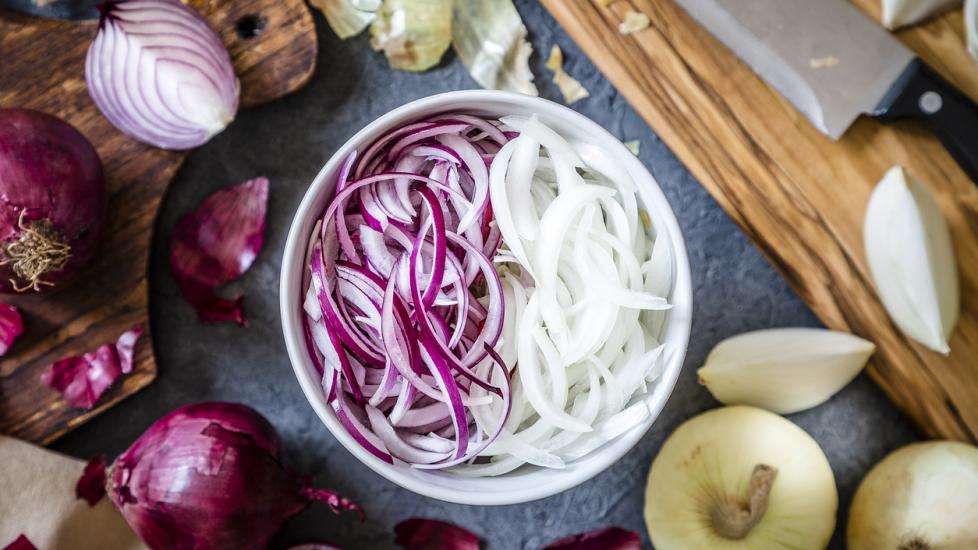Can Dogs Eat Onions?
Onions are often a staple in the kitchen, offering amazing aromas and tasty additions to some of our favorite dishes. However, this vegetable is dangerous for dogs to eat.
Here’s some useful information on why dogs can’t eat onions and what to do if you suspect your dog may have eaten raw onions, cooked onions, or any food containing onions or onion powder.
Are Onions Bad for Dogs?
Yes, onions are toxic to dogs and should not be eaten. Whether cooked or raw, all parts of the onion and onion plant are toxic to dogs, including the bulb, leaves, juice, and processed powders. No form of onion should be included in your pet’s diet or treats. Care should also be taken to prevent dogs from getting into any gardens with onions or wild onion patches.
Onions belong to the genus Allium, and their scientific name is Allium cepa (cepa is Latin for “onion”).
They contain a toxic compound, N-propyl disulfide, that damages red blood cells, which leads to their breakdown and destruction. This process, called hemolysis, results in anemia and red or brown discoloration of urine. With anemia, the body’s organs are no longer getting enough oxygen. In severe cases, this can result in organ failure and death.
Can Dogs Eat Green Onions or Chives?
Green onions (Allium fistulosum) and chives (Allium schoenoprasum) are both members of the Allium genus and are also toxic to dogs. Dogs should not eat any form of onion—red, white, yellow, sweet, green onions, chives, leeks, or even garlic—as these are all members of the Allium genus.
How Much Onion Is Toxic to Dogs?
Onion poisoning is consistently noted in pets who consume more than 0.5% of their body weight in onions. When dogs ingest large amounts of onion, it can be deadly. The amount of onion that would be dangerous for your dog depends on your dog’s weight and a few other factors that can make them more at risk.
Dogs that may be more susceptible to onion poisoning include:
-
Dogs with concurrent diseases such as diabetes, liver disease, or anemia
-
Dogs on certain medications
To help determine how much onion is dangerous based on your dog’s size, it is helpful to establish some parameters in onion size. For our purposes, one medium onion would be similar in size to a navel orange and would weight approximately 1/2 pound. An onion of this size would produce about 1 cup of diced onion, or be equal to 1 tablespoon of onion powder.
One medium onion = 1 cup of diced onions = 1 tablespoon (or 3 teaspoons) of onion powder
If your dog has ingested close to or more than the amounts noted below, take them to the vet immediately. Toxic amounts of onion for dogs:

Signs of Onion Poisoning in Dogs
If your dog has eaten onions, clinical signs may develop within a day or more. Take your dog to the vet if they ate the amounts listed in the chart above or show these signs:
-
Abdominal pain
-
Pale gums
-
Lethargy/Weakness
-
Stumbling or loss of balance
-
Exercise intolerance
-
Red or brown urine
-
Increased respiratory rate
-
Increased heart rate
What If My Dog Ate Onions?
Do not induce vomiting at home unless you have been specifically instructed to do so by a veterinarian. If you think your pet has eaten onions, or you saw them eat onions, do not wait to seek veterinary care. Dogs should be treated as quickly as possible.
If your dog has eaten onions, the first thing to do is to determine how much onion or onion-containing product was consumed. If you are unsure or the amounts are close to or greater than those listed in the chart above, take your pet to the vet immediately.
You can also call your veterinarian, the Pet Poison Helpline at 855-764-7661, or the ASPCA Animal Poison Control Center at 888-426-4435 for more help determining if your pet needs to go to the emergency room.
How Do Vets Treat Onion Poisoning in Dogs?
Diagnosis of onion poisoning is typically through a combination of history, clinical signs, and microscopic examination of a blood sample. The toxic compound in onions creates specific structural damage to the red blood cells called a Heinz bodies, which can be seen under a microscope.
If your pet ate the onions within the past 2 hours, your veterinarian will likely start treatment by inducing vomiting at the hospital as a means of decontamination. They may also give activated charcoal to bind any additional toxin. In severe cases, your pet may need to be hospitalized for IV fluids or a blood transfusion.
Most dogs recover from mild ingestion of onions and do not have any long-term complications. However, severe onion poisoning can be fatal, especially without treatment. Prevention is key—do not allow your dog to eat onion or foods containing onion or onion powder.
References
Help us make PetMD better
Was this article helpful?
